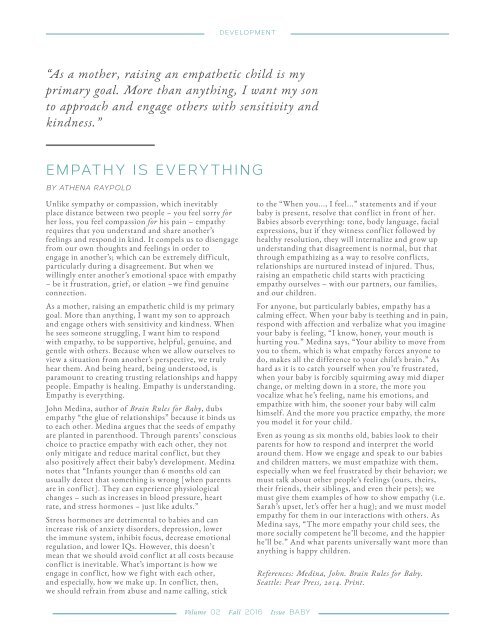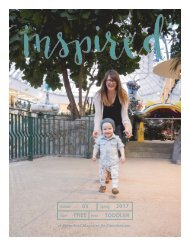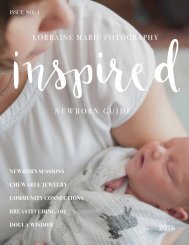Yeg Inspired, Baby Issue
Life with Babies, Identity as Mother, Play, Feeding Struggles. With Featured Advertisers, Pamper & Play, Edmonton and Area Doula's, Birth Photographer by Appletree Photography
Life with Babies, Identity as Mother, Play, Feeding Struggles.
With Featured Advertisers, Pamper & Play, Edmonton and Area Doula's, Birth Photographer by Appletree Photography
You also want an ePaper? Increase the reach of your titles
YUMPU automatically turns print PDFs into web optimized ePapers that Google loves.
DEVELOPMENT<br />
“As a mother, raising an empathetic child is my<br />
primary goal. More than anything, I want my son<br />
to approach and engage others with sensitivity and<br />
kindness.”<br />
EMPATHY IS EVERYTHING<br />
BY ATHENA RAYPOLD<br />
Unlike sympathy or compassion, which inevitably<br />
place distance between two people – you feel sorry for<br />
her loss, you feel compassion for his pain – empathy<br />
requires that you understand and share another’s<br />
feelings and respond in kind. It compels us to disengage<br />
from our own thoughts and feelings in order to<br />
engage in another’s; which can be extremely difficult,<br />
particularly during a disagreement. But when we<br />
willingly enter another’s emotional space with empathy<br />
– be it frustration, grief, or elation –we find genuine<br />
connection.<br />
As a mother, raising an empathetic child is my primary<br />
goal. More than anything, I want my son to approach<br />
and engage others with sensitivity and kindness. When<br />
he sees someone struggling, I want him to respond<br />
with empathy, to be supportive, helpful, genuine, and<br />
gentle with others. Because when we allow ourselves to<br />
view a situation from another’s perspective, we truly<br />
hear them. And being heard, being understood, is<br />
paramount to creating trusting relationships and happy<br />
people. Empathy is healing. Empathy is understanding.<br />
Empathy is everything.<br />
John Medina, author of Brain Rules for <strong>Baby</strong>, dubs<br />
empathy “the glue of relationships” because it binds us<br />
to each other. Medina argues that the seeds of empathy<br />
are planted in parenthood. Through parents’ conscious<br />
choice to practice empathy with each other, they not<br />
only mitigate and reduce marital conflict, but they<br />
also positively affect their baby’s development. Medina<br />
notes that “Infants younger than 6 months old can<br />
usually detect that something is wrong [when parents<br />
are in conflict]. They can experience physiological<br />
changes – such as increases in blood pressure, heart<br />
rate, and stress hormones – just like adults.”<br />
Stress hormones are detrimental to babies and can<br />
increase risk of anxiety disorders, depression, lower<br />
the immune system, inhibit focus, decrease emotional<br />
regulation, and lower IQs. However, this doesn’t<br />
mean that we should avoid conflict at all costs because<br />
conflict is inevitable. What’s important is how we<br />
engage in conflict, how we fight with each other,<br />
and especially, how we make up. In conflict, then,<br />
we should refrain from abuse and name calling, stick<br />
to the “When you..., I feel...” statements and if your<br />
baby is present, resolve that conflict in front of her.<br />
Babies absorb everything: tone, body language, facial<br />
expressions, but if they witness conflict followed by<br />
healthy resolution, they will internalize and grow up<br />
understanding that disagreement is normal, but that<br />
through empathizing as a way to resolve conflicts,<br />
relationships are nurtured instead of injured. Thus,<br />
raising an empathetic child starts with practicing<br />
empathy ourselves – with our partners, our families,<br />
and our children.<br />
For anyone, but particularly babies, empathy has a<br />
calming effect. When your baby is teething and in pain,<br />
respond with affection and verbalize what you imagine<br />
your baby is feeling, “I know, honey, your mouth is<br />
hurting you.” Medina says, “Your ability to move from<br />
you to them, which is what empathy forces anyone to<br />
do, makes all the difference to your child’s brain.” As<br />
hard as it is to catch yourself when you’re frustrated,<br />
when your baby is forcibly squirming away mid diaper<br />
change, or melting down in a store, the more you<br />
vocalize what he’s feeling, name his emotions, and<br />
empathize with him, the sooner your baby will calm<br />
himself. And the more you practice empathy, the more<br />
you model it for your child.<br />
Even as young as six months old, babies look to their<br />
parents for how to respond and interpret the world<br />
around them. How we engage and speak to our babies<br />
and children matters, we must empathize with them,<br />
especially when we feel frustrated by their behavior; we<br />
must talk about other people’s feelings (ours, theirs,<br />
their friends, their siblings, and even their pets); we<br />
must give them examples of how to show empathy (i.e.<br />
Sarah’s upset, let’s offer her a hug); and we must model<br />
empathy for them in our interactions with others. As<br />
Medina says, “The more empathy your child sees, the<br />
more socially competent he’ll become, and the happier<br />
he’ll be.” And what parents universally want more than<br />
anything is happy children.<br />
References: Medina, John. Brain Rules for <strong>Baby</strong>.<br />
Seattle: Pear Press, 2014. Print.<br />
Volume 02 Fall 2016 <strong>Issue</strong> BABY





